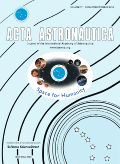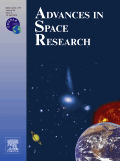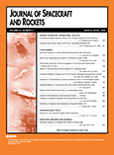
ACTA ASTRONAUTICA
metrics 2024
Leading the Way in Orbital Mechanics and Design
Introduction
ACTA ASTRONAUTICA is a premier journal in the field of aerospace engineering, dedicated to advancing knowledge in space exploration and technology. Published by PERGAMON-ELSEVIER SCIENCE LTD in the United Kingdom, this journal boasts a prestigious Q1 ranking within its category as of 2023, positioning it in the top tier of aerospace engineering publications. With an ISSN of 0094-5765 and an E-ISSN of 1879-2030, ACTA ASTRONAUTICA has been a crucial resource for researchers and professionals since its inception in 1974, continuing to publish cutting-edge research through to 2024. The journal focuses on a wide range of topics, from orbital mechanics and spacecraft design to astronautics and planetary science, aiming to inspire innovation and facilitate the exchange of ideas among scholars, industry experts, and students. ACTA ASTRONAUTICA is ranked 19th out of 153 in its field, highlighting its importance and influence within the aerospace community. Researchers seeking a reputable platform to share their findings will find this journal to be an essential part of the academic discourse in aerospace engineering.
Metrics 2024
 1.11
1.11 3.10
3.10 3.10
3.10 105
105Metrics History
Rank 2024
Scopus
IF (Web Of Science)
JCI (Web Of Science)
Quartile History
Similar Journals

ADVANCES IN SPACE RESEARCH
Connecting Disciplines to Illuminate the Heavens.ADVANCES IN SPACE RESEARCH, published by Elsevier Science Ltd, is a leading journal in the fields of Aerospace Engineering, Astronomy and Astrophysics, Atmospheric Science, and more. Since its inception in 1981, this journal has dedicated itself to the dissemination of high-quality research contributing to the understanding of space and planetary sciences through a multidisciplinary lens. With an impressive impact factor reflected in its positioning within the Q1 and Q2 quartiles across various categories, it serves as an essential resource for researchers and professionals alike. The journal's rigorous peer review process ensures that only the most relevant and groundbreaking studies are published, making it a cornerstone for those navigating the complexities of space research. The journal is accessible by subscription, inviting a global readership to engage with trailblazing research that influences future advancements and fosters collaborations across the scientific community. With a reputation for excellence, ADVANCES IN SPACE RESEARCH remains committed to pushing the boundaries of knowledge in the ever-evolving field of space exploration.

SPACE SCIENCE REVIEWS
Pioneering Insights in Space and Planetary ScienceSPACE SCIENCE REVIEWS, published by Springer, is a premier interdisciplinary journal that has been at the forefront of space science research since its inception in 1962. With an impressive impact factor and a distinguished Q1 ranking in both Astronomy and Astrophysics, as well as Space and Planetary Science, it stands as a leading platform for the dissemination of cutting-edge research. The journal encompasses comprehensive reviews covering a diverse array of topics, from cosmic phenomena to planetary exploration, serving as a critical resource for researchers, professionals, and students alike. Although it operates primarily under a subscription model, its commitment to excellence and rigorous peer-review process ensures that each article meets the highest standards of scientific integrity. With its headquarters in the Netherlands, SPACE SCIENCE REVIEWS is positioned strategically to foster global collaboration in the field, making it an invaluable asset for anyone interested in the ever-evolving landscape of space science.

AEROSPACE AMERICA
Pioneering Insights for Tomorrow's Aerospace LeadersAerospace America, published by the American Institute of Aeronautics and Astronautics, stands as a crucial platform within the field of aerospace engineering. With over 30 years of dedication to advancing aerospace knowledge, the journal provides a comprehensive exploration of topics ranging from cutting-edge aerospace technology to aviation policy and industry developments. While it currently resides in the fourth quartile of the Scopus rankings for aerospace engineering, the journal aims to enhance its visibility and impact among researchers, professionals, and students. Access to its content is traditionally through institutional subscriptions, aligning with its mission to foster informed discussions and innovations in aerospace. As professionals and academics navigate the evolving landscape of aeronautics, Aerospace America remains a pivotal resource for those committed to the future of aerospace exploration and technology.

Chinese Space Science and Technology
Exploring the Frontiers of Space InnovationChinese Space Science and Technology is a pivotal journal dedicated to advancing the field of space engineering and technology, published by the esteemed Chinese Academy of Space Technology. With an ISSN of 1000-758X, this publication serves as a significant platform for cutting-edge research from China and around the globe, spanning vital intersections of Aerospace Engineering, Electrical and Electronic Engineering, and Materials Science. As evidenced by its Q3 ranking in 2023 across these categories, the journal consistently showcases innovative studies that contribute to the development of space technology, thereby impacting both theoretical frameworks and practical applications in the industry. Researchers and professionals will find valuable insights within its pages, while students can enrich their educational journey through its wealth of knowledge. Though primarily published in print, the journal continues to foster collaboration and engagement among the academic community, offering a glimpse into the future of space exploration and technological advancements through its relevant and timely content.

New Space-The Journal of Space Entrepreneurship and Innovation
Navigating the Nexus of Business and AerospaceNew Space - The Journal of Space Entrepreneurship and Innovation is a pivotal publication dedicated to advancing the field of aerospace through innovative research and practical insights. Published by Mary Ann Liebert, Inc., this journal serves as a crucial platform for scholars, engineers, and entrepreneurs interested in the burgeoning sectors of space technology and commercial space endeavors. With an ISSN of 2168-0256 and an E-ISSN of 2168-0264, New Space explores the intersection of engineering, sustainability, and business within the aerospace industry. The journal's impact is highlighted by its Q3 ranking in multiple categories, including Aerospace Engineering and Astronomy and Astrophysics, signifying its relevance in contemporary research dialogues. Although currently closed access, the journal's dedication to fostering innovations is clear as it addresses critical topics from safety and risk management to energy technologies and tourism in space contexts. Researchers and professionals seeking to influence the future of space entrepreneurship will find valuable content and a collaborative community within these pages, making New Space an essential resource in its field.

Journal of Space Safety Engineering
Advancing aerospace safety through innovative engineering.The Journal of Space Safety Engineering, published by ELSEVIER, is a pioneering platform dedicated to advancing the field of aerospace safety and engineering. Since its inception in 2014, this journal has catered to researchers and professionals focusing on the crucial intersection of aerospace engineering and safety, risk, reliability, and quality management. With an ISSN of 2468-8975 and E-ISSN of 2468-8967, it has established itself within the academic community, currently holding a Q3 ranking in both Aerospace Engineering and Safety, Risk, Reliability, and Quality categories, according to the 2023 metrics. The journal, which covers converged years up to 2024, is instrumental for those seeking to explore innovative safety solutions in space missions and exploration, making it an essential resource for students, industry professionals, and researchers alike. Although it is not open access, it remains a credible source of impactful studies that contribute to enhancing safety protocols and engineering practices in aerospace endeavors. With a strong focus on rigorously vetted research, the Journal of Space Safety Engineering ensures that important advancements in this dynamic and vital field are shared widely among experts and stakeholders.

International Journal of Aeronautical and Space Sciences
Pioneering Insights in Aerospace EngineeringThe International Journal of Aeronautical and Space Sciences, published by Springer, is a prominent platform dedicated to advancing research and innovation in the fields of Aerospace Engineering, Control and Systems Engineering, Electrical and Electronic Engineering, and Materials Science. With an ISSN of 2093-274X and an E-ISSN of 2093-2480, the journal has established itself as a vital resource since its inception in 2011, currently offering insights that span a wide range of contemporary challenges and technological advancements in aeronautics and space exploration. Ranking in the Q2 category across multiple disciplines, including Aerospace and Control Engineering, signifies its recognized impact and quality within the academic community. Although not an open-access journal, it remains accessible to researchers, professionals, and students seeking to enhance their understanding of complex aerospace systems and their applications. The journal’s commitment to publishing high-quality research makes it indispensable for those aiming to contribute to, or stay informed about, the evolving landscape of aerospace technology.

JOURNAL OF SPACECRAFT AND ROCKETS
Connecting Researchers to the Cosmos.The Journal of Spacecraft and Rockets, published by the American Institute of Aeronautics and Astronautics, serves as a premier platform for disseminating cutting-edge research in the fields of aerospace engineering and space science. Established in 1964, this esteemed journal has evolved over nearly six decades, solidifying its reputation with a consistent publication history through 2024. With an impact factor positioning it within the Q2 quartile in both Aerospace Engineering and Space and Planetary Science categories, it ranks as a vital resource, featuring high-quality manuscripts that address the latest advancements and findings in spacecraft design, propulsion systems, and austere planetary exploration. The journal's rigorous peer-review process ensures that articles meet the high academic standards expected by practitioners in the aerospace sector. Researchers, engineers, and students alike will find the Journal of Spacecraft and Rockets to be an invaluable resource for both foundational knowledge and innovative research developments, advancing the future of aeronautics and astronautics.

Space: Science & Technology
Elevating Research Standards in Space SciencesSpace: Science & Technology is a premier, open-access journal published by the American Association for the Advancement of Science, dedicated to advancing knowledge in the rapidly evolving fields of aerospace engineering and space sciences. Since its inception in 2021, the journal has rapidly established itself as a vital resource, achieving an impressive Q1 ranking in Aerospace Engineering and Q2 ranking in Space and Planetary Science as of 2023. With a Scopus rank placing it 45th out of 153 in Aerospace Engineering and 47th out of 104 in Space and Planetary Science, it serves as a critical platform for researchers, engineers, and students alike to disseminate their findings and engage with the latest developments in their field. The journal encourages innovative research articles, technical notes, and reviews that push the boundaries of what's possible in space exploration and technology. With its commitment to open access since 2021, Space: Science & Technology ensures that pioneering research is readily available to a global audience, promoting collaboration and knowledge sharing in an increasingly interconnected scientific community.

SOLAR SYSTEM RESEARCH
Navigating the Complexities of Our Solar SystemSOLAR SYSTEM RESEARCH, published by Pleides Publishing Inc, offers a comprehensive platform for the exploration and dissemination of scientific knowledge in the fields of Astronomy, Astrophysics, and Space and Planetary Science. With its origins tracing back to 1969, this journal provides a vital resource for researchers and professionals seeking to deepen their understanding of the solar system's complexities, including planetary formation, extraterrestrial geology, and the dynamics of celestial bodies. Although categorized in the Q4 quartile for both relevant disciplines, SOLAR SYSTEM RESEARCH remains committed to publishing high-quality research that contributes to advancing contemporary scientific discourse. Dedicated to fostering collaboration and innovation, the journal is indexed in Scopus and adheres to rigorous academic standards, making it an essential resource for students and professionals alike pursuing the latest developments in solar system studies.